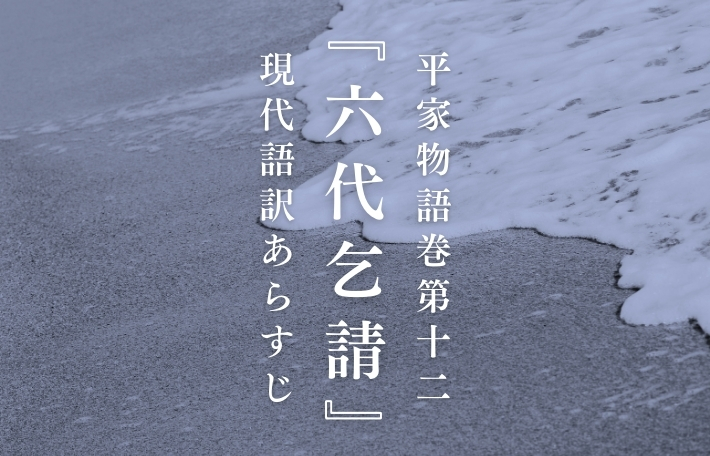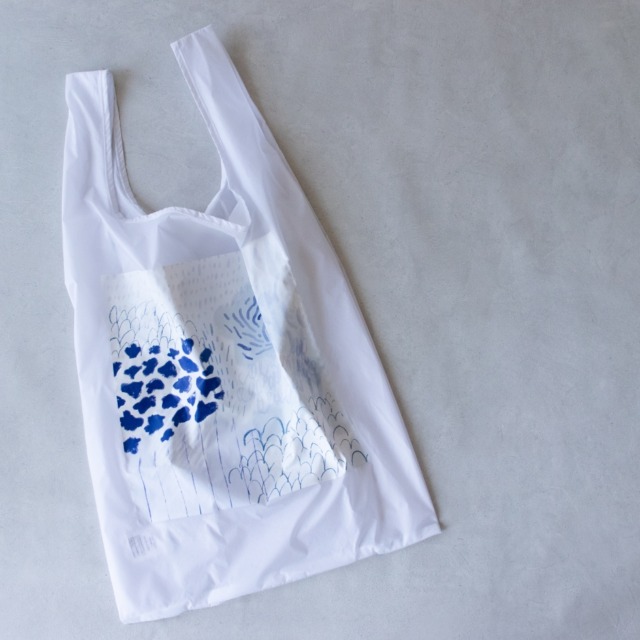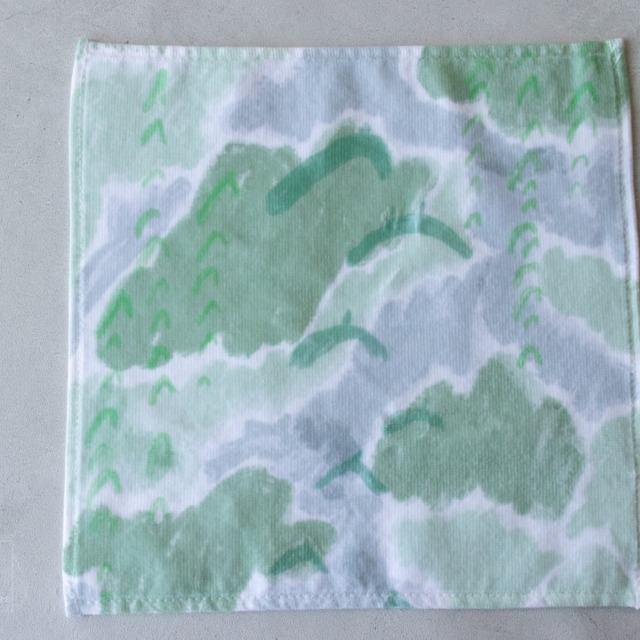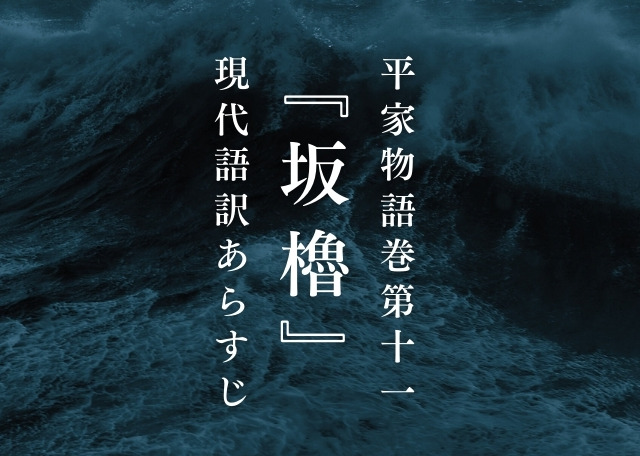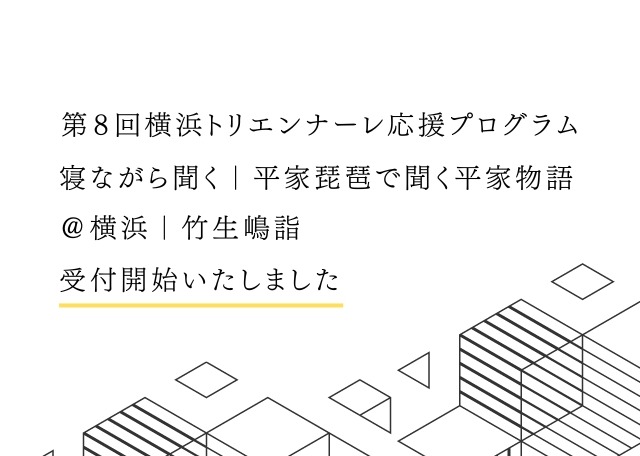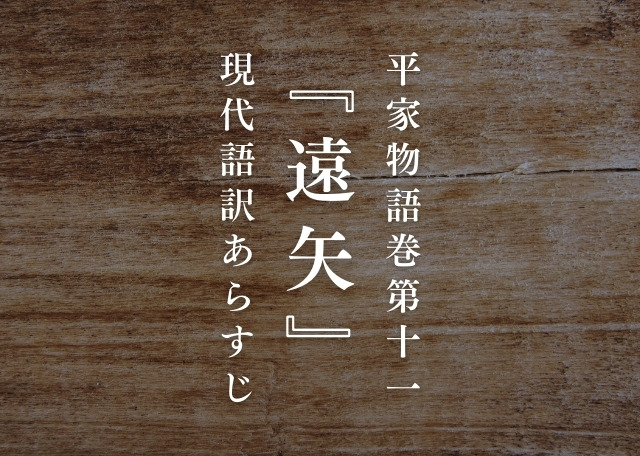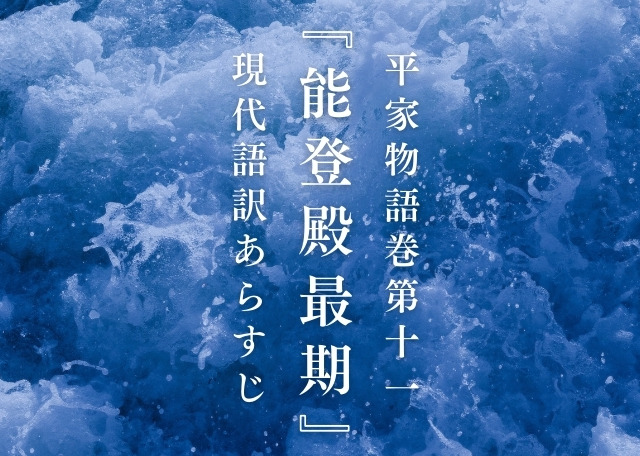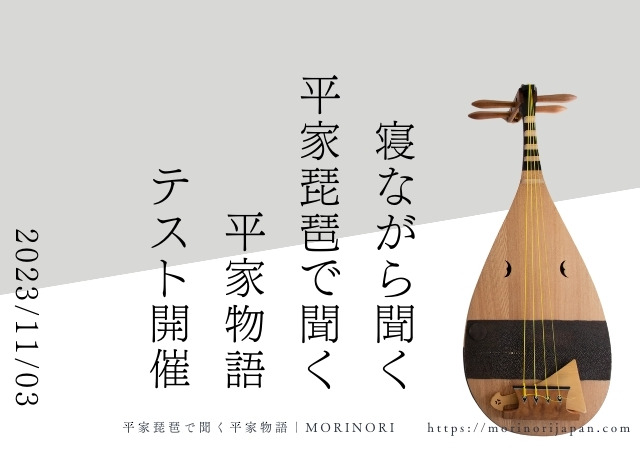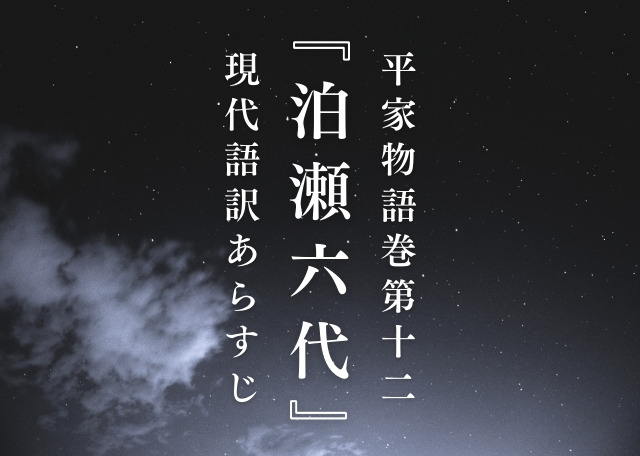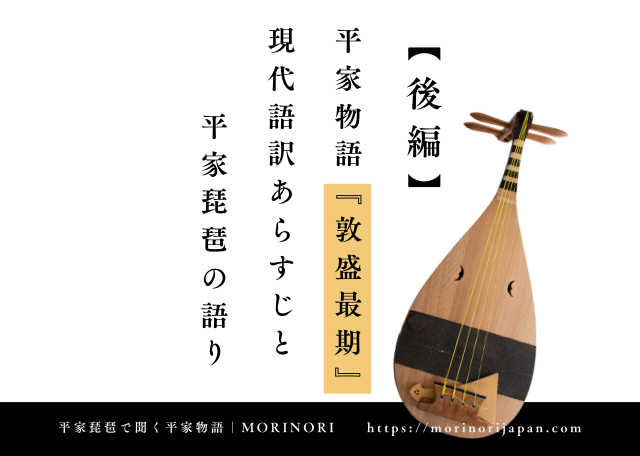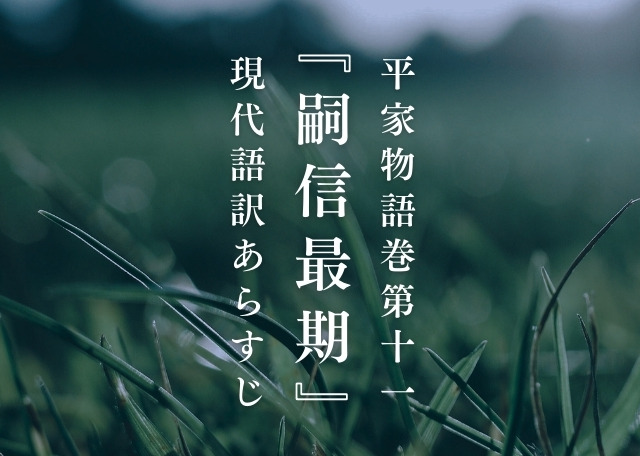Welcome to our site.
This is the website of MORINORI, which holds small Heikyoku (a performance of the Heike Monogatari accompanied by Heike biwa) concerts and lectures. On this page, we introduce a modern translation of the Heike Monogatari, Volume 12, “Rokudaikoiuke”. It’s not very good, but please take a look if you like.
▼For first-time visitors
https://morinorijapan.com/en/welcome
▼Program introduction
https://morinorijapan.com/en/performance-lineup
▼Listen to Heikyoku
https://morinorijapan.com/en/watch-the-sound/
▼Click here for a list of modern translations of the Tale of the Heike
The Tale of the Heike is performed at concerts and lectures, etc., in modern Japanese translation.
https://morinorijapan.com/en/category/tale-of-the-heike-en/
A brief summary of the twelfth volume of the Tale of the Heike, “Rokudaikoiuke”
Hojo Shiro Tokimasa issued an order from the Kamakura Shogunate to capture every single male member of the Heike clan. Many people in Kyoto competed to find the descendants of the Heike clan in order to receive a reward, and many Heike children were captured one after another. However, the whereabouts of the young lord of the Heike, the legitimate successor to the Heike, Komatsuno sanmino chujo Yorimori, were difficult to find. One day, Yorimori’s lady-in-waiting betrayed the place where he was hiding, and Hojo immediately surrounded the place and captured Yorimori. The mother and nannies, in despair, broke down in tears, but the nanny met Seibun Mongaku, who lived in Takao, and begged him to save the young lord’s life and make him his disciple.
Mongaku went to Rokuhara and showed Rokudai Gozen, and strongly felt that he could not lose this young lord, so he asked for a twenty-day reprieve. Hojo, thinking of Mongaku’s earnest request and the connection with the Kamakura Lord behind it, granted him an extension of twenty days. In this way, Rokudai Gozen When the group reached Senbon Matsubara, the person who had been ordered to execute Rokudai Gozen was unable to do so, and Mongaku arrived with a letter from the Kamakura

The Tale of the Heike, Volume XII: Rokudaikoiuke – Full modern translation of the
text, which was transcribed from the Heikyoku score “Rokudaikoiuke”.
Later, while Hojo Shiro Tokimasa was acting as the guardian of the capital, he announced that he would give any reward he wished to anyone who could find and hand over every single male member of the Taira clan. In response to this, many people of all ranks in Kyoto became desperate to find the descendants of the Taira clan in order to receive the reward.
As a result, many Heike children were found one after another, and even if they were the children of low-status people, if they were fair-skinned and good-looking, they were said to be “the young lord of such-and-such a chūjō” or “the child of such-and-such a shōshō”. The parents were sad and grieved, but when they heard things like “the wet nurse said so” or “the lady-in-waiting told me”, the young children were mercilessly drowned or buried in the ground, and the older children were suffocated or stabbed to death. The mothers’ grief and the wet nurses’ lamentations were unfathomably deep.
Amidst all this, a rumor spread that there was a young lord and a young lady, the sixth and seventh generation of the Komatsuno sanmino chujo, respectively. As they were the direct descendants of the Taira clan and were also a little older, a search party was sent out to find them and take their lives, but they were not found easily, and as they were about to head down to Kanto, a lady-in-waiting visited Rokuhara and told him that “the young lord and his daughter were hiding in Shobudani, on the north side of the mountain temple called Daikakuji, deep in the mountains behind Henjyoji”. Hojo was delighted to hear this, and immediately sent someone to search the area. They found the women and children living in a very humble way in a temple.
When I looked through the gap in the hedge, I saw a beautiful young lord following a white dog that had run out into the garden. When the nanny’s wife saw this, she hurriedly pulled the young lord back inside, saying, “Oh, what a shame if people saw us here.” Those who saw this were convinced that this was the sixth lord, and they hurried back to Rokuhara to report this.
The next day, Hojo laid siege to Shobudani and announced, “I have heard that the young lord, Komatsuno sanmino chujo Koremori, and his wife, Rokudai Gozen, are here. Hojo Shiro Tokimasa, acting as the Kamakura Shogun’s deputy, has come to receive you. Please
The mother hugged the young lord and wailed, “Please kill me,” and the wet nurse also cried out with all her might. The people of the household, who had usually been quiet and unobtrusive, now wept and mourned in unison.
Hojo also felt sorry for the situation and waited for a while, wiping away his tears. He sent another messenger, who said, “The world is still in turmoil, and unforeseen circumstances may occur. “Tokimasa is here to receive you, so please come out quickly.” The young lord told his mother, ‘There is no way to escape now. I hope you will leave quickly. If the samurai have already entered the house and are searching around, it will make the situation even more unsightly. Even if I leave, I will return after a while to ask for leave, so please do not grieve.’ He said calmly.
Realizing there was nothing more she could do, the mother put the young lord’s clothes on him, combed his hair with a comb, and tried to send him off, but she gave him a small, beautiful black wooden rosary and told him, “Take this and, no matter what happens, chant the name of Buddha and go to paradise.” The young lord said, “This is the last time I will see you, Mother. I want to go and see Father now.” His younger sister, the princess, wanted to go with him, but the nanny stopped her.
Although Rokudai Gozen was only twelve years old, she was more mature than most children of fourteen or fifteen, and she had a good heart, so she tried to hold back her tears so as not to show weakness to her enemies, but tears flowed down her sleeve. They were carried on a palanquin, surrounded by samurai, and set off. Saitougo and Saitouroku also accompanied them on either side of the palanquin. Hojo had horses ready for them, but they did not ride, and instead walked barefoot from Daikakuji to Rokuhara.
The mother and the wet nurse wept and wailed, looking up to the heavens and down to the earth, but there was nothing they could do. After a while, the mother spoke to the wet nurse, saying, “I have heard that these days, the Heike children are being captured and their lives are being taken in various ways, such as being drowned in water, buried in the ground, suffocated, or stabbed to death. My own child may be lost in the same way. He is a little older now, so I’m sure they will be beheaded. The child is left in the care of a wet nurse, and I sometimes go to see how he is doing. Even just this is a sad thing for a parent. What’s more, since the child was born, not a single day has passed when he has not been with me, and I have raised him as if he were an important part of myself. Since parting with the person I had been relying on, the two of us have supported each other, but now I have one but not the other. What should I do from now on? For the past three years, I have been thinking about this day and night, but even so, I never imagined that it would happen so suddenly. I have always relied on the Kannon statue at Hase, but in the end, I was caught. I cried, pressing my sleeve to my face and saying, “Even now, at this very moment, that child is being lost.”
Even at night, the mother felt a tightness in her chest and was unable to sleep. She spoke to the nanny again, saying, “While I was dozing off a little earlier, this child came riding on a white horse. He said he had come to ask for a little time off because he missed me so much, and he sat down beside me. He seemed to be resenting the world in some way, but when I woke up in surprise, there was no one there. He lamented, “Even in a dream, I woke up so quickly, and that makes me sad.” He was unable to stay awake the rest of the night, and continued to cry so much that the tears made the floor float. There is a limit to the night, and when the official who announces the time of day announced that morning had come, Saitouroku returned.
When my mother asked how things were going, I said, “So far, there have been no particular problems. Here is a letter.” When she opened it and read it, she said, “So far, there have been no particular problems. I can only imagine how worried you all must be. Everyone is thinking of you.” She pressed the letter to her face and lay there for a while without saying anything. Eventually, some time passed, and Saitouroku said, “It’s been quite a while, so I’d like to go back after receiving a reply.” The mother wrote a reply with tears in her eyes and gave it to him, and Saitouroku took his leave.
The wet nurse’s wife, at least, left Daikakuji and continued to walk aimlessly, crying. Then someone told her, “There is a holy man called Mongaku at a temple in the mountains called Takao, and he is trusted by the Kamakura lord as someone very important. It seems that he wants to take the child of a noblewoman as his disciple.” The wet nurse’s wife heard this and hurried to Takao to see the priest, crying out, “The young lord, who I raised from a baby in my arms, will be twelve years old this year, and was captured by the samurai yesterday. Please save his life and take him as your disciple.” She collapsed and cried out, sparing no effort with her voice. Her appearance was truly pitiful beyond words.
Sei also felt sorry for the wet nurse’s wife and asked her about the details. The wet nurse’s wife was choked with tears and couldn’t reply for a while, but eventually she stopped crying, got up, and said, “I served Komatsuno sanmino chujo Tadamori-no-kami closely. Someone must have said that the young lord was the son of the chujo-dono. I was captured by a samurai yesterday.” When Sei asked who the samurai was, the wet nurse replied, “He said his name was Hojo Shiro Tokimasa.” Sei said, “Then I’ll go and ask him,” and left.
The wet nurse’s wife did not believe in the words of the priest, but since yesterday, when the young lord was captured by the samurai, she had had little hope, so hearing the priest’s words calmed her down a little and she returned to Daikakuji. The mother said, “I thought that Wagozen had already thrown herself into the water. I was also thinking of throwing myself into a river or deep pool.” She then asked her wet-nurse’s wife for the details. When the wet-nurse’s wife told her in detail what Seisho had said, the mother burst into tears of joy, saying, ”If that’s the case, I want you to leave the child with Seisho and let me see her again.”
After that, Hijiri went to Rokuhara to ask Hojo about the situation. Hojo said, “I have been ordered by the Kamakura lord to find and capture all the male descendants of the Heike clan and put them to death. This time, too, I have captured many children and killed them all. Among them, I have heard that the sixth princess, the young daughter of Komatsuno sanmino chujo Koremori, was born from the belly of the late Nakanokado no shinnakanojo Koremochi. He was the legitimate heir to the Heike clan, and as he was a little older, we were looking for him with particular care, but we could not find him. We finally found out where he was the day before yesterday, and came to pick him up here yesterday. However, we were so struck by his beauty that we could not bring ourselves to do anything to him.”
Sei said, “Then I would like to see the young lord,” and approached him to take a look. The young lord was wearing a double-woven straight-cut robe and had a black wooden rosary hanging from his hand. His appearance, both in terms of his hair and his demeanor, was truly elegant, and he did not seem like a person of this world. Seeing his slightly haggard face, which suggested that he had not yet relaxed and fallen asleep, made Hijiri’s heart ache even more, and he felt an even greater sense of affection for him.
The young lord looked at Hijiri and was moved to tears. Mongaku also saw this and naturally his ink-stained sleeves became wet. He thought to himself that even if he became an enemy in the future, how could he take the young lord’s life? So, Seisho turned to Hojo and said, “This must be a karmic retribution from a previous life. As soon as I saw the young lord, I felt a tightness in my chest and an unbearable pain. Please extend his life for another 20 days. I will go down to Kamakura and tell this to the Kamakura Lord and ask for forgiveness. Once, on my way to Kyoto to ask for an imperial edict to allow the Kamakura Lord to live in this world, I tried to cross the Fuji River at night without knowing the way and nearly got swept away. Also, when I was attacked by bandits on Mt. Takaichi and barely managed to reach the Kago Palace in Fukuhara, I presented the imperial edict to the shogun, who promised me, “No matter how important the matter, I will grant your request as long as Yoritomo is alive.” In addition, I am sure that Kamakura-dono is well aware of my service to him up until now. He will surely honor this promise and not take my life lightly. There is no way that Kamakura-dono would forget his word.” With that, he left at dawn.
Saitougo and Saitouroku felt as if Seisho was a living Buddha, and they joined their hands and wept. When they returned to Daikakuji and told their mother and wet nurse about this, you can imagine how happy they were. However, they still had some anxiety about what would happen depending on the decision made in Kamakura. Nevertheless, the fact that he had been given twenty more days to live brought them some peace of mind, and they felt that this was thanks to the blessings of the Kannon of Hase, and they felt reassured.
As the days passed, the 20th day of the promise had come and gone. It seemed like a dream, and Seiji still hadn’t shown up. I was worried about what was going on, and I was once again tormented by my anxious thoughts. Hojo had also passed the 20th day that Seiji had mentioned, so he could no longer stay in Kyoto any longer and was about to go down to Kamakura. Saitougo and Saitouroku were also doing their best, but Mongakubou still hadn’t shown up, and not even a messenger had come up. The two returned to Daikakuji Temple and, while crying, told their mother that “the priest has not yet appeared, and Hojo is also said to be descending at dawn,” and their mother lamented, “I believed that the priest’s words, which were so reassuring, were the blessing of the Goddess of Mercy, but now that dawn is approaching, what will become of us?” The wet nurse’s wife also wept, and all the people in the house wept and grieved in unison.
The mother asks, “Please tell the elder who shows mercy to take Rokudai until he meets Mongaku. Even if Seigo helps Rokudai, what should we do if he is cut down before that? When I asked him if he was about to lose his life, he replied, “I think it will be around this time of day. Because until recently, the retainers of the Hojo family who were on duty were all reluctant to leave, and I have heard that some of them were even crying and chanting Buddhist prayers.” When the mother asked how the child was doing, the attendant reported, “When people are watching, he acts as if nothing is wrong and keeps on reciting his beads. But when there are no people around, he weeps by his side.”
When the mother heard this, she said, “I’m sure you must be feeling very lonely. You said that although he was young, his heart was kind and mature, and that if you waited a little while, he would come back soon after asking for time off, but more than 20 days have already passed and he hasn’t gone anywhere, and we haven’t seen him, and we thought that tonight would be the last night of his life, and how lonely we must have felt. What are you two going to do?” The two replied, “We will follow you wherever you go, and if anything should happen to you, we will take your ashes and wear them around our necks, and we will go to Koyasan to become priests and mourn your passing.” The mother said, “Time is pressing, so go back quickly,” and the two left the place while holding back their tears.
On the 17th of December, Hojo Shiro Tokimasa finally left the capital with the young lord. Saitougo and Saitouroku also accompanied him on either side of the palanquin. Hojo told them to dismount and ride the horses, but they replied, “We are your last attendants, so it is not too much to ask,” and they went down the hill barefoot, shedding tears of blood.
The young lord said farewell to his mother and wet nurse, took one last look at the capital he had grown so accustomed to, and rode off to the east, never to return, heading for the distant eastern provinces. When I think about his feelings, I can’t help but feel sorry for him. If he saw a warrior urging his horse on, he would fear that his head would be cut off at any moment, and if he heard someone speaking, he would feel his heart tighten, wondering if it had something to do with him. After passing Shinomiya-gawara and crossing Sekiyama, by the time they reached Otsu-no-ura, the young lord was beginning to wonder if they were in Awazu-no-hara, and the sun was beginning to set. As they passed through country after country and inn after inn, they reached Suruga Province, and the young lord felt that his fragile life was about to come to an end.
At the Senbon Matsubara (literally “thousand pine grove”), the palanquin was stopped, and the samurai dismounted, spread out a mat, and prepared to take the young lord down from the palanquin. Hojo hurriedly jumped off his horse and approached the young lord’s side, saying, “There is no other reason for bringing you here. I have been waiting for you in the hope that I might be able to see the holy one. However, it is difficult to know what Lord Kamakura is thinking, so I will report to him that you have been lost in Omi Province. You are a person who feels everything, so no matter who says it, you will not be able to escape.” The young lord said nothing in response, and called Saitougo and Saitouroku to him and spoke to them. “You must return to the capital and not say that I was killed on the road. This is because it will be impossible to hide my death, but if my mother hears about it and grieves, it will be painful for me even if I am hiding in the shadows of the grass, and it will be a hindrance for future generations. You must report that I was safely delivered to Kamakura.”
The two retainers were choked with tears and, with their faces down, were unable to reply for a while. Eventually, Saitougo, while holding back his tears, said, “Even if we survive after you, how could we possibly return to the capital in one piece?” and again choked with tears and sank down. When it seemed that his end was near, the warriors saw the young lord brush back the hair on his shoulders with his small, beautiful hands, and they felt “Oh, how pitiful, is there still some will left in him?” and wept, their armor sleeves wet with tears. After that, the young lord put his hands together and faced west, chanting the name of Buddha at a high volume about a hundred times. Then, he stretched out his neck and waited quietly for his end.
Kudo Mitsuchika of Kano was chosen to be the one to cut the young lord, and he took his sword and stood behind the young lord from the left side, ready to strike. However, at that moment, he felt dizzy and his heart disappeared, and he didn’t know where to swing the sword down, so in the end he couldn’t do it, and he threw away the sword and retreated, saying, “I can’t do it at all, please give the order to someone else.” Then, while he was choosing which of them to cut down, a monk wearing a black robe and riding a palomino horse came galloping up, whipping his horse. “How sad, in this pine grove, a young lord of peerless beauty is about to be beheaded by Hojo Shiro-dono,” he said, and as the people around him gathered one after another, the priest felt pained, and tried to get their attention by raising his hand, but as he was unsure of what to do, he took off the hat he was wearing and held it up to invite them.
Hojo was waiting for something to happen, and soon after, this priest arrived on horseback. The priest jumped off his horse in a hurry and said, “I would like to take the young lord. Here is the letter from Lord Kamakura,” and took out a document. Hojo opened the letter and read it. It said, “I have found the son of Komatsuno sanmino chujo Tadamori, Rokudai Gozen, but Mongaku-bo wants to keep him for a while. Please give him to Hojo Shiro-dono without question. Yoritomo” It was signed and sealed.
Hojo read the document over a few times, and when he had finished, he exclaimed “How wondrous, how wondrous”, and not only Saitougo and Saitouroku, but all of Hojo’s retainers wept tears of joy.
▼Click here for a list of modern translations of the Tale of the Heike
*The Tale of the Heike is performed at concerts and lectures, etc., in modern Japanese translation.
https://morinorijapan.com/category/tale-of-the-heike/
Thank you for reading this far.
I hope to see you somewhere someday.

